|
|
This week in: Peace & Security Publications |
IPSI | Africa | Americas | East Asia | Middle East | South Asia
|
|
|
|
|
This week in Peace & Security Publications
|
|
|
|
|
Online and On All Fronts: Russia’s Assault on Freedom of Expression
Since 2012, the Russian authorities have intensified a crackdown on freedom of expression, selectively casting certain kinds of criticism of the government as threats to state security and public stability and introducing significant restrictions to online expression and invasive surveillance of online activity.
|
|
|
|
|
|
 The Sarajevo Symposium featured in Bosnian newspaper Oslobodjenje The Sarajevo Symposium featured in Bosnian newspaper Oslobodjenje
|
|
 IPSI Sarajevo Symposium launches with former Presidents of Bosnia and Herzegovina and Croatia, as well as the German Ambassador, highlighting the importance of the event. IPSI Sarajevo Symposium launches with former Presidents of Bosnia and Herzegovina and Croatia, as well as the German Ambassador, highlighting the importance of the event.
|
 NATO promotes its role in the Sarajevo Symposium! NATO promotes its role in the Sarajevo Symposium!
|
|
|
|
|
|
|
Sarajevo Blogs!
Experience the Sarajevo Symposium on Post-Conflict Transitions through the eyes of the participants in their daily blog!
|
|
|
|
|
|
|
This week in Sub-Saharan Africa
|
|
|
|
|
KENYA: Uncertainty regarding the August 8 elections
On Wednesday, Kenya’s Independent Electoral and Boundaries Commission preparedness for fair elections was, again, called into question. Local activists claim that the Biometric Voter Register, which allows voters to use their fingerprints to register, was not verified and may enable rigging, thus, it should not be used. On July 7, the High Court ruled in favor of the opposition party annulling the printing of the presidential ballots given that the printing company had been chosen without public input. Another court case challenges the use of backup ballots. Comment: A decade after post-election violence in Kenya, with fewer than three weeks before the elections, these uncertainties have many groups, including corporations, concerned that violence may occur or that elections will have to be postponed. (Nation, StandardMedia, AllAfrica)
|
|
|
|
|
|
Nigeria: High-level Boko Haram leader surrendered to the Nigerian Army
On Monday, a high-level Boko Haram leader, Konto Fanami and three other militants surrendered to the Nigerian army. Fanami was the leader of the Kafa hideout. The army Spokesperson, Sani Usman, reported that the Boko Haram militants surrendered due to the hardships and having realized they had been wrongfully misled and “brainwashed” about Islam, the Nigerian Army, and society. Mr. Usman encouraged other militants to surrender as well and promised to treat them “humanely.” Comment: The Borno Elders Forum, a group of retired military and civilians, recently called upon the group to give up arms. Despite the correlation, there is no certainty as to the causation of Fanami and the other militants surrendering. (PremiumTimesNG, Pulse, AllAfrica)
|
|
|
|
|
|
REGIONAL: UN Food and Agriculture Organization issues alert over third consecutive failed rainy season
On Friday, the UN Food and Agriculture Organization (FAO) issued an alert after the lack of rain endangered the amount of food available in East Africa. The past three seasons have experienced less rain than usual with some areas receiving less than half of their seasonal rainfall. Somalia, Ethiopia, Tanzania, and Kenya are among the most affected. The drought inhibits resilience in a region already affected by high cattle mortality rates and conflict. The poor animal conditions have led to low livestock prices in contrast with high grain prices. FAO’s Director of Emergencies, Dominique Burgeon, stated that an increase in humanitarian response and an expansion into sustainability support will be necessary to address this issue. Comment: FAO reports that an estimated 16 million people in eastern Africa are currently in need of humanitarian assistance. This is a 30 percent increase from late 2016. In Somalia, almost half of the population does not have enough food, according to the FAO. (UgandaRadioNetwork, AllAfrica, FAO)
Researched/Written by Angelica Aimé Silfa
|
|
|
|
|
This week in the Americas & Caribbean
|
|
|
|
|
MEXICO: UN demands cease of spyware attacks from Mexican government
On Wednesday, UN human rights experts called a joint statement on the government of Mexico to “cease the surveillance immediately” of activists and journalists and to conduct a fully impartial investigation into the illegal spying. Human rights organizations such as WOLA and Amnesty International suggested on Friday that an independent panel of international experts should conduct the investigations. Mexican President Enrique Pena Nieto has asked the Attorney General’s office to investigate previous charges, which he describes as “false.” Comment: Mexican activists, journalists, human-rights lawyers and opposition officials have been targeted by a software known as Pegasus, which, according to a Citizen Lab report, Israeli company NSO Group sells exclusively to governments. Most recent protests were sparked by Citizen Lab’s July 10 report, which showed that investigators of the disappearance of 43 students in Guerrero in 2014 were targeted with Pegasus. WOLA describes the past year as one of the most violent moments for journalists and human rights defenders in Mexico, with at least seven journalists and six human rights defenders killed in the country so far. (Reuters, Citizen Lab, WOLA, OHCHR)
|
|
|
|
|
|
PERU: Mine workers strike
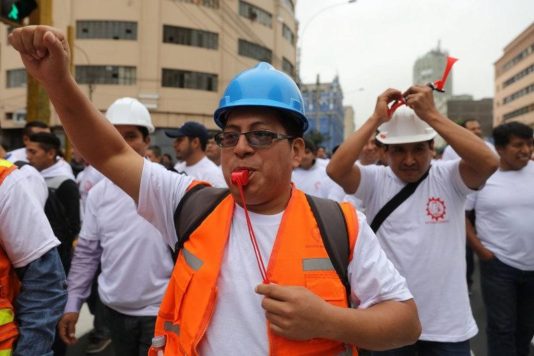 |
|
On Wednesday, union workers from more than 50 mines in Peru began a nationwide strike to protest against a labor reform that they say will harm workers’ rights. Protesters claim that the new legislation will enable mass layoffs and weaken security inspection bodies. The leader of the National Federation of Mining, Metallurgical and Steel Workers, Ricardo Juarez, declared that more than 94 percent of the country’s unions have joined the “indefinite” strike, despite the Labor Ministry’s refusal to authorize it. The Peruvian Energy and Mines Minister described the strike’s effect as “relatively limited,” since most companies have backup plans and equipment. Comment: Peru is the world’s second-largest copper producer and the sixth-largest gold and tin producer. The mining exports account for 60 percent of the country’s total shipments. These strikes, along with strikes from other unions including teachers and public doctors, occur as Peruvian President Kuczynski establishes reforms in seek to raise private investment to help the local economy. (TeleSur, The Associated Press, Reuters)
|
|
|
|
|
|
VENEZUELA: Opposition holds referendum
|
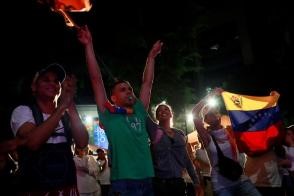 |
On Sunday, Venezuela’s Democratic Unity (Mesa de la Unidad Democrática, MUD) opposition coalition organized an unofficial referendum to gauge popular support of President Nicolás Maduro’s plan to hold a constituent assembly. This marks the citizens’ first opportunity to engage politically since the 2015 legislative election. Of the massive 7,186,000 turnout, 98 percent of voters signaled their disapproval, despite alleged censorship and threats from pro-government factions. Violence included an alleged pro-government “paramilitary” gang who opened fire on a crowd of voters, killing one woman and injuring three. The MUD issued a declaration of steps it would take if it comes to power, including addressing food and medicine shortages. A general strike began on Thursday morning, where homemade blockades littered the streets of Caracas and most shops and businesses closed. Comment: Venezuela’s government intends to hold a July 30 election to select an assembly charged with rewriting the nation’s charter. Venezuela’s defense minister announced the army will be deployed across the country next in preparation for predicted turmoil. The Venezuela government maintains that it will go ahead with the elections despite increasing international pressure not to, including the U.S. threat to increase economic sanctions this week. (TeleSur, El Nuevo Herald, The Associated Press, The Guardian, The New York Times)
Researched/Written by Nastasia Stipo
|
|
|
|
|
|
This week in East Asia & Pacific
|
|
|
|
|
INDONESIA: Ministry of Maritime Affairs renames portion of South China Sea
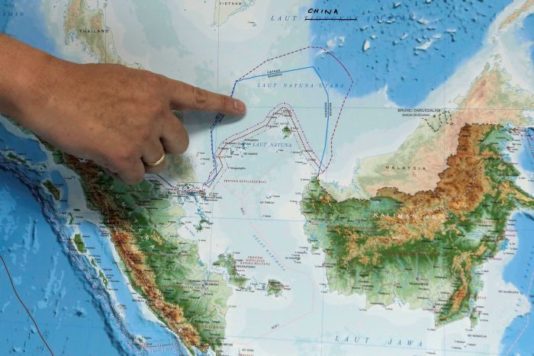 |
|
On Friday, the Indonesian Ministry of Maritime Affairs renamed the northern part of its economic zone in the South China Sea the “North Natuna Sea.” In response, Chinese Foreign Ministry Spokesmen Geng Shuang commented that “certain countries’ renaming is totally meaningless,” while asserting that the current name of the area was the one that delineated borders and had international recognition. Comment: China and Southeast Asian states frequently dispute over the South China Sea for its abundant hydrocarbon and fishing resources. While Indonesia is a non-claimant state in most South China Sea disputes, Indonesian and Chinese have frequently clashed over fishing rights around the Natuna Islands. The newly renamed sea encompasses China’s proclaimed, but contentious maritime boundary, the “nine dash line”. Analysts interpret the renaming as a political and diplomatic assertion of Indonesia’s sovereignty. (Channel News Asia, Reuters, CNN)
|
|
|
|
|
|
PHILIPPINES: President Duterte asks congress for extension of martial law
On Tuesday, President Duterte requested in a letter to Congress to extend martial law on Mindanao island until the end of the year to sufficiently quell the rebellion in Marawi incited by the Islamic State. The original martial law was scheduled to end on July 22, 2017. Multiple human rights activists and Duterte critics have argued that an extension of the law is unnecessary and authoritarian. According to Duterte’s letter, “the primary objective of the possible extension is to allow our forces to continue with their operation unhampered by deadlines and to focus more on the liberation of Marawi and its rehabilitation and rebuilding.” Comment: Mindanao Island was put under martial law on May 23 after Mate and Abu Sayyef militants laid siege to Marawi. Despite claims that the fighting in Marawi would end within days, the siege has lasted for 57 days, resulting in the deaths of 413 militants, 98 security forces, and 45 civilians and an estimated 200,0000 refugees. (Reuters, New York Times, Philippine Star)
|
|
|
|
|
|
THAILAND: Judge declares 21 guilty for trafficking in landmark case
|
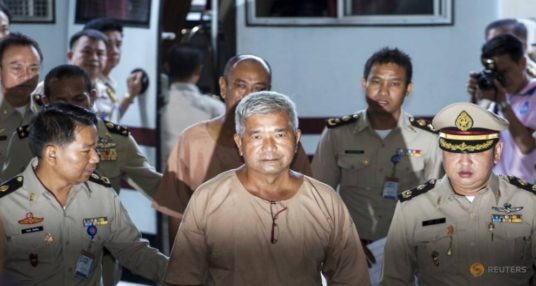 |
On Wednesday, a Thai judge handed down 21 out of 22 guilty verdicts in cases of human trafficking to several high-ranking officials. The convicted, including an army general, police officers, local politicians and Myanmar nationals, were accused of smuggling and trafficking migrants across the Thai-Malaysia border. Some have been concurrently convicted with charges related to forcible detention leading to death, rape and organized transnational crime. While exact sentences for the convicted have not been given, the most severe possible penalty is the death sentence. Comment: The trial began in 2015 after the discovery of shallow mass graves near the Thai-Malaysia border suspected to be part of a jungle camp where traffickers detained migrants unable to pay their fee, many believed to be Rohingya fleeing persecution. The resulting crackdown has led the Thailand government to claim that it has almost abolished trafficking systems entirely from the country. (Channel News Asia, South China Morning Post, The Nation)
Researched/Written by Laura Bisbee
|
|
|
|
|
|
This week in Europe & Central Asia
|
|
|
|
|
GEORGIA/UKRAINE: Presidents sign declaration to establish partnership toward EU integration
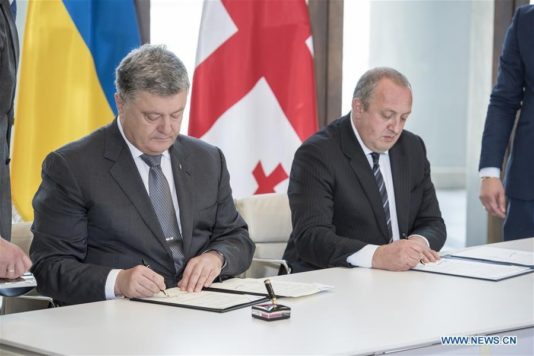 |
|
On Tuesday, Ukrainian President Petro Poroshenko and Georgian President Giorgi Margvelashvili met in Tbilisi and signed the Declaration on the Establishment of Strategic Partnership – pledging their mutual support for one another’s countries. Both presidents vowed to share information and resources regarding defense capabilities, defend each country’s sovereignty, and coordinate their efforts towards joining the EU. Comment: Each country has faced similar challenges and threats to their sovereignty from Russia. In 2008, Russia and Georgia fought a brief war over the regions of South Ossetia and Abkhazia, where Russian troops still remain. In 2014, Moscow illegally annexed Crimea, and continues to support pro-Russian separatists. Both Georgia and Ukraine have expressed desires to join the European Union, and Poroshenko has set 2020 as a target date for an EU membership application from Ukraine. (Ukraine Today, Ukrinform, Kyiv Post, Xinhua Net, RFE/RL)
|
|
|
|
|
|
MONTENEGRO: Trial of alleged pro-Russian coup plotters delayed indefinitely
On Wednesday, the trial of 14 individuals accused of plotting to assassinate the Prime Minister and stage a coup to keep Montenegro from joining NATO was delayed over a motion from the defense to replace the state prosecutor. The defendants, who include two leaders of the opposition Democratic Front, nine Serbians, another Montenegrin, and two Russians being tried in absentia, are charged with creating a criminal organization to take over the government and install a pro-Russian party. The defense is now calling for the state prosecutor to be removed from the case after publishing a transcript of a conversation between a defendant and his lawyer, prompting one defendant to call the trial a “staged political process” to discredit the pro-Russian Democratic Front party. The prosecutor’s office said the motion is an attempt to undermine the investigation. Comment: Montenegro believes that Russian state bodies were involved in the attempted coup, a claim that Russia denies. Russia strongly objected to Montenegro’s joining NATO in June, and the Russian Foreign Ministry has said Moscow reserves the right to respond to “anti-Russian hysteria” with retaliatory measures. (Balkan Insight, Washington Post, RFE/RL 1, 2, Reuters)
|
|
|
|
|
|
TURKEY: Court rules that six human rights activists will remain in prison on terror charges
|
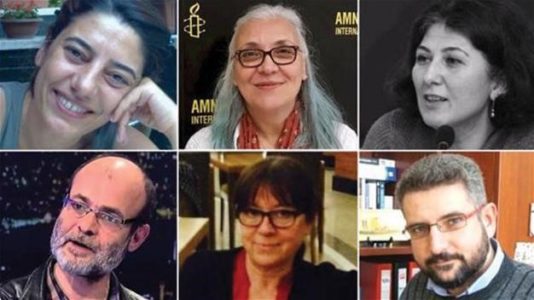 |
On Tuesday, a Turkish court ruled that six human rights activists, including the director of Amnesty International Turkey as well as activists from the Human Rights Agenda Association and the Helsinki Citizens Assembly, will remain in prison for allegedly being linked to the Kurdistan Workers’ Party (PKK), the Gulen network, and for “committing a crime in the name of a terrorist organization without being a member.” The six activists were arrested along with four others in a police raid on July 5 while attending a digital security workshop in a hotel on the island of Buyukada. Comment: This is the first time in Amnesty International’s 56-year history that both a country chairperson and director have been under arrest at the same time, and Amnesty International’s secretary general has called the investigation “a politically motivated witch-hunt that charts a frightening future for rights in Turkey.” The U.S. Ambassador to Turkey, the U.S. State Department, German Chancellor Angela Merkel, and others have joined Amnesty International in calling for the release of the activists. More than 50,000 individuals have been jailed with no set trial dates in Turkey’s post-coup crackdown since last year. (Hurriyet Daily News, Telegraph, AP, Amnesty 1, 2)
Researched/Written by Natalie A. Landau
|
|
|
|
|
|
This week in the Middle East & North Africa
|
|
|
|
|
SAUDI ARABIA: Saudi woman in viral miniskirt video released with no charges
On Tuesday, Saudi police arrested and then released a woman without charges after a video of her wearing a miniskirt and cropped top in public went viral. The police arrested the woman for wearing “immodest clothes” while walking around a historic village north of the capital Riyadh. A statement released by the Center for International Communication on Wednesday stated that the video was published without the young woman’s knowledge. Comment: This story drew the attention of critics condemning Saudi Arabia’s laws restricting women and pointing out the double standard of the laws that do not apply to royalty. The kingdom’s religious police, known as “mutawwiun,” are officially no longer allowed to arrest people. (Aljazeera, CNN, BBC, The Independent, Reuters)
|
|
|
|
|
|
SYRIA: Turkey reveals locations of U.S. troops in northern Syria; Pentagon complains
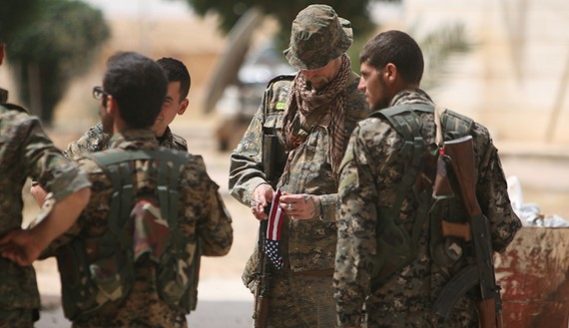 |
|
On Tuesday, Turkey’s state-run news agency Anadolu published a report listing 10 U.S. military base locations in northern Syria, as well as numbers of U.S. and French troops in some of those bases. The report, published in both Turkish and English, said the bases were located in “the terrorist PKK/PYD-held Syrian territories;” Kurdish groups, PKK/PYD, are considered terrorist organizations by the Turkish government. The Pentagon stated it had conveyed its concern to the Turkish government, and U.S. Defense Department spokesman Eric Pahon stated, “we would be very concerned if officials from a NATO ally would purposefully endanger our forces by releasing sensitive information.” Comment: In spite of the military alliance between the U.S. and Turkey dating back to the Cold War, they have significant disagreements over U.S. backing of Kurdish groups in northern and northeastern Syria. (Al-Monitor, Business Insider, The Washington Post, Reuters)
|
|
|
|
|
|
QATAR: Blockaders modify demands to end Qatar crisis
On Tuesday, Saudi Arabia’s UN Ambassador Abdallah al-Mouallimi stated that the four Arab countries leading the blockade against Qatar have reduced their 13-demand list to six “principles,” and that they are committed to these six “principles” as agreed upon at a meeting in Cairo on July 5. The “core principals” include commitment to fighting terrorism and extremism, preventing financing and creating a safe haven for “such groups,” and suspending any provocations or speeches that incite hatred and violence. Mouallimi said that it is essential to end incitement to violence, but that shutting Al Jazeera down might not be necessary. UAE Ambassador Lana Nusseibeh said at the briefing that Qatar was risking the expulsion from the Gulf Cooperation Council (GCC) if it fails to comply with the principles. Comment: The quartet cut ties and all land, sea and air routes with Qatar on June 5 due to Qatar’s “support of terrorism.” Modification of the demands list came after U.S. Secretary of State, Rex Tillerson, visited the Gulf countries last week. (Gulf Business, Gulf Times, BBC)
Researched/Written by Atika Alkhallouf
|
|
|
|
|
|
BANGLADESH: Human rights activist detained in Malaysia
On Thursday, Bangladeshi human rights activist, Adilur Rahman Khan, was detained and denied legal counsel in Malaysia for undisclosed reasons. Suaram, a Malaysian human rights organization, along with the Asian Human Rights Commission, have publicly demanded for Khan’s immediate release. Malaysia has a history of denying pro-democracy advocates. Comment: Khan is an advocate of the Supreme Court of Bangladesh, a former Deputy Attorney General for Bangladesh, and the Founder and Secretary of the human rights organization Odhikar. Malaysia recently blocked other human rights defenders from entering the country. (Free Malaysia Today, Malaysiakini, Strait Times, The Independent, New Indian Express)
|
|
|
|
|
|
INDIA: Government willing to talk to China, with condition, on Sikkim border dispute
On Thursday, Indian Minister of External Affairs Sushma Swaraj, stated India will hold bilateral discussions with China concerning the Sikkim border dispute if both countries agree to pull-back forces from the area. On June 16, Indian troops crossed the Bhutan-China border at Sikkim to prevent the construction of a road that they believe will negatively impact the security of India. China agrees diplomatic channels are open, but states that withdrawal of Indian troops serves as a precondition for Chinese troop withdrawal. Comment: Indian National Security Advisor Ajit Doval will visit Beijing for the meeting of National Security Advisors from BRICS countries next week and will further address the security implications of the conflict. (Deccan Herald, Live Mint, NDTV, Forbes, Associated Press)
|
|
|
|
|
|
SRI LANKA: UN expert calls on Sri Lanka to focus on human rights
On Friday, UN Special Rapporteur on Human Rights, Ben Emmerson, urged Sri Lanka to address human rights issues, especially towards Tamils. The Prime Minister assured Emmerson that upon completion of counter-terror reform, a truth and reconciliation commission will be established, and it will bring charges to those involved in serious crimes. Comment: Human rights abuses reportedly continue despite the end of Sri Lanka’s civil war in 2009. During Emmerson’s interviews with former and current detainees conducted under the Prevention of Terrorism Act, he claimed to hear “distressing” stories from them, including several methods of torture. (Colombo Page, Colombo Gazette, SL Guardian, Washington Post)
Researched/Written by Rabia Uddin
|
|
|
|
|